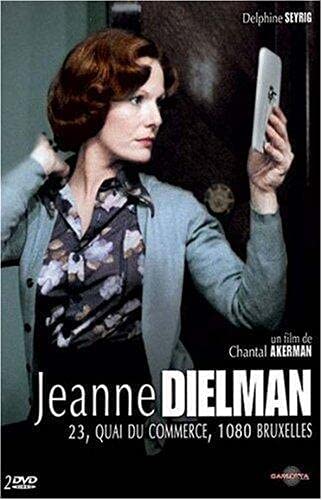Prior to watching Chantal Akerman's 1975 film "Jeanne Dielman, 23 Quai du Commerce, 1080 Bruxelles", a title that foreshadows the tone of the film in describing in great detail the quotidian banality of the life of the central character, I had watched Akerman's 1968 "Saute Ma Ville" sometime during the second wave of Covid.
The film stars Delphine Seyrig, here astonishingly transmogrified from the glamorous romantic heroine of Alain Resnais' "Last Year at Marienbad" - which for some reason I have yet to review, but then my viewing habits have become more sporadic since the pandemic began to ease its grip - into the no-hair-out-of-place heroine of this film.
Shot over a few weeks in a single domestic setting of the apartment Jeanne Dielman shares with her teenaged son, and some exteriors, the film details Dielman's life, outwardly very ordinary, routine and respectable to the point of being mechanical as she struggles to keep up appearances as a single parent, but is contrasted by her "other business" to make ends meet, which is entertaining a string of regular male clients who pay for her sexual services, something she conducts in a very perfunctory way and without any sense of enjoyment.
Her son appears vaguely aware of what is going on when he is out of the house and at college, though we are never entirely sure.
Akerman structures the film as a series of extended takes as we see Jeanne perform domestic duties, or move from room to room, or go shopping, that could on the face of it, make for extremely dull viewing but this is necessary when you consider the film's shocking conclusion. There's an almost forensic quality to the way the film is made that is reminiscent of the films of Ozu in the way the domestic environment becomes a stage and the limitations of theatre become a virtue in film when you don't have a budget that allows for a more ambitious cinematic style.
The cracks begin to show as the strain of maintaining a veneer of respectability begins to take its' toll of Jeanne as her repetitive routine begins to unravel, her knitting perhaps an unintended metaphor, and she begins to question her existence, triggered by her son one evening when he brings up the issue of sex and his estranged father, something that catapults Jeanne into the tragic events that follow.
To avoid spoilers all I will say is that "Saute Ma Ville" revealed a strand of black humour in Akerman's work borne out of her own struggles as a woman in a very male-dominated field and the way in which women are forced to accept lives of drudgery within marriage, certainly during the period in which she emerged as a film maker, and "Jeanne Dielman" is very much a feminist tract and I will reveal no more other than I do wonder if the film's "climax" is another example of Akerman's black humour combined with a lingering sense of desperation that perhaps led to her premature death from suicide.
The film ends with what must one of the longest single shots in any film in a film of many such long, static camera shots as Jeanne sits in her drawing room as the day gradually draws to a close and ending a tour de force of acting and direction from Delphine Seyrig and Chantal Akerman.
Akerman employs some clever cinematic devices to act both as a contrast to Jeanne's state of mind before and after things go awry and to signal to the viewer that something is not quite right. This is most evident in a single protracted take of Jeanne meticulously preparing the evening meal of a meatloaf and with no inter-cutting or camera angle changes and later when Akerman flips the camera position 180 degrees in Jeanne's tiny kitchen to imply that her world has literally turned upside down.
"Jeanne Dielman" makes a point about the right of women to have control of their own bodies and Jeanne's life becomes a metaphor for that in as much as she makes the rules and defines the parameters of her existence, something that is ultimately upturned by men and turns "Jeanne Dielman" into a tale of existential horror.
"Jeanne Dielman, 23 Quai du Commerce, 1080 Bruxelles", Dir: Chantal Akerman, 1975
Mubi Channel, BFI Player, Criterion Channel




Comentarios